- Home
- Sebastian Junger
A World Made of Blood (Kindle Single)
A World Made of Blood (Kindle Single) Read online
A World Made of Blood
By Sebastian Junger
BYLINER FICTION
Copyright © 2012 by Sebastian Junger
All rights reserved
Cover Image © James Cotier/Getty Images
ISBN: 978-1-61452-054-2
Byliner Inc.
San Francisco, California
www.byliner.com
For press inquiries, please contact [email protected]
10 9 8 7 6 5 4 3 2 1
Table of Contents
Story
About the Author
About Byliner
Byliner Originals & Byliner Fiction
“Andre?”
Nothing.
“Andre, this is bad.”
Daniel says this into the new darkness that has come in suddenly, with strange birdcalls and a restless murmuring of the forest. A few of the soldiers turn their heads, but Daniel can barely see their faces now. He doesn’t know them by name anyway. There’s nothing left of the long, blazing day behind them but the West African heat. It sits heavily amid the palm trees and radiates from the pitted asphalt road. Daniel lights a cigarette to see if anyone will tell him to put it out. For a minute or two, no one says anything, and he’s tempted to think maybe they’re not in such a bad spot until the captain makes a hissing sound from across the clearing. Daniel looks up and nods and stubs it into the sandy soil.
The soldiers are strung along the road in no particular formation. They’ve backed the armored personnel carrier up into the clearing and thrown some palm fronds over it. For some reason, the stubby little barrel points out toward the road, though Daniel can’t imagine anyone trying to approach that way. They’d come quietly through the trees and then suddenly the darkness would explode. Or at least that’s how Daniel imagines it. He’s never been in anything like that—few of them have, despite the cocktail-party stories that come later. Andre finally walks over. Andre’s the photographer. Andre’s been through all of this before.
“What’s happening, mate?” he says. Andre’s Australian. He and Daniel have been together for a couple of weeks now.
“Apparently this is a nonsmoking flight.”
“It’s ridiculous. We’re miles away.”
“Maybe we’re not. Maybe they’re right over there.”
Andre looks around and shrugs. “You got any water?”
Daniel pulls a plastic water bottle out of his pack and hands it over. It’s half empty; they bought three bottles in town this morning before they came out here, and two are already gone. “We’re obviously not going back tonight.”
Andre doesn’t answer, just settles down in the dirt beside Daniel. Andre’s had malaria twice, and so he’s back on the Lariam pills that prompt a famously psychotic reaction in him. The pills give him bad dreams or bad ideas about the darkness. Once he woke up shouting because an old lady was standing over him trying to put something in his mouth—a beetle or something. The old lady disappeared when Daniel jumped up and turned the light on. Andre got up and went to the bathroom and washed his mouth out anyway.
That was back in the rotting little capital that everyone is fighting over. The fighting is at least twenty miles outside of town, but the presidential palace has anti-aircraft batteries on the roof, and all the embassies have been abandoned. The country is free to do whatever it wants to itself.
When they left the capital this morning, taxi drivers refused to take Daniel and Andre past the first cluster of charred cars that mark the high-water point of the offensive; beyond that, the villages were gutted and the animals were dead. Once in a while there was a body in the ditch, undulating with vermin and stinking up a half-mile of road. They drove as far as they could and then got out of the taxi and started walking. Everyone else was headed the other way: beautiful young women with babies on their hips and children carrying bags and old ladies with aluminum pots on their heads for cooking and old men with skin like ruined parchment. The old men had no expression, no comment on what was happening, but the old women were angry and they would rattle at you in the native Krio if you looked at them. The soldiers were the worst; they were nothing but teenagers, and they drifted back from the fighting in small groups and then larger groups, out of bullets, out of food, out of whatever narrow sense of duty put them out here in the first place. There were no officers among them and no radios and no discipline; even the villagers kept their eyes down when they walked past.
Andre and Daniel eventually got a ride from a captain who was leading a detachment of forty kids in baggy uniforms. They were regular army but looked even shabbier than the rebels they were fighting. The captain himself was rigid and old-school in a way that suggested implacable loyalty to whoever was calling the shots. He was about fifty, and his uniform was immaculate and absurdly pressed in the jungle heat. His men walked double file behind the armored personnel carrier, and the captain brought his machine to a stop and told his soldiers to check their papers and then waved Andre and Daniel into the vehicle. The double steel doors opened in the back and they stepped in. They drove another hour until they could hear gunfire up ahead. The APC stopped and the kids spread out along the flanks of the road, then continued slowly for another half-mile.
The gunfire got louder and more insistent. The sound turned Daniel’s insides heavy as lead but seemed to make Andre come alive. He and Andre had worked together several times in the past few months, but this was the first time they’d been in combat. Everyone was saying it was going to be ’99 all over again—a three-week rampage of slaughter and mass rape—but Andre shrugged the idea off. Either he didn’t think so or he didn’t care. At the sound of gunfire, he double-tied his shoelaces and rechecked his cameras and zipped up the pockets on his photographer’s vest. He looked the part, and he seemed to enjoy looking the part, but he wasn’t the sort of arrogant prick that Daniel had braced himself for. He worked hard and he cared about people—which was more than you could say about a lot of journalists—and people liked him. Children gathered around him and laughed at things he did, and teenage girls in town shot him shy, challenging looks as he walked through the market. Even the whores at the hotel seemed taken by him.
Daniel tried taking notes, but there wasn’t much to say, and his hands were shaking anyway. At one point the gunfire had suddenly become very heavy and very close, and the APC stopped again and the gunner swept the turret barrel from left to right and back again to survey the jungle around them. The gun shot big, fat rounds that exploded on impact, and it could clear a lot of ground, but this was open palm forest with undergrowth along the road, and the rebels could be anywhere. The soldiers were tensed in a half crouch with their guns pointing ahead of them. They looked tentative and confused and utterly unready for whatever was about to happen. The captain said something in Krio and the APC started up again and the soldiers advanced, their faces blank now and sweat making their foreheads gleam in the high sun. Daniel felt like throwing up.
It turned out to be just celebratory fire in the town of Masiaka. Government militia—more kids, really, given guns and told to point them toward the enemy—had stormed in this morning, but of course no one had radios, so the captain had no idea who was doing the shooting up ahead. Apparently the militias had been expecting more of a fight, and so when they got into town there was too much ammunition left. It was only a matter of time before someone started shooting it into the air.
The APC stopped at the edge of the main plaza, and Daniel watched things get steadily out of hand. The captain looked powerless to do anything about it and didn’t even try. He told his men to keep their guns cocked. There were a few bodies clustered by what must have been an old colonial administrat
ive building, and Andre wandered through the gunfire to take photos, but Daniel didn’t want to leave the vicinity of the APC. He was the writer, and he could see what was happening quite well from there. An argument developed between two of the commanders—Daniel later found out it was over who had done the most fighting—and very quickly guns were leveled and the plaza cleared, and the captain backed the APC up and put his men in defensive position on the edge of town. The various government militias disliked one another almost as much as they disliked the rebels—in fact, some of them were rebels not that long ago—and the regular army kept a healthy distance from all of them.
The shouting died down as quickly as it had started, and the guns came down and there were handshakes and the fighters moved on up the road. That was midafternoon. The captain decided that they shouldn’t proceed further until reinforcements arrived. They sat in the shade for a few hours, smoking and talking. Once in a while Andre would walk out to the road and peer in one direction and then the other and then come back shaking his head. He was hoping there was some way to get a ride back to town so he could file his photos, but that clearly wasn’t going to happen. They were stuck here at least for the night. And that was the good scenario.
* * *
Now it’s full dark—no moon, even—and Daniel leans back against a palm tree and listens to the chatter of the forest. The sounds get quieter until there’s almost nothing but the low voices of the soldiers around him. An occasional bird screech somewhere, a rattle of insects. Andre is quiet, maybe he’s sleeping, and the soldiers are just shapes in the darkness. There are sentries somewhere out there in the bush, but they’re probably asleep as well. For some reason, there are no mosquitoes; back in Freetown there were swarms of them. Foul, ruined Freetown … children with no arms and packs of feral dogs on the white-sand beaches and young toughs standing around on street corners with long knives in their belts. Daniel was sent there several weeks ago by an American newspaper to cover the peacekeeping efforts, but the situation fell apart almost immediately, and suddenly you couldn’t even go out at night without risking your life. The rebels were moving mortars and their ammo trucks forward in preparation for an assault, and more rebels were rumored to be in the city itself, just waiting for the signal to rise up. People in the city were jumpy and paranoid—the last time the rebels had gotten this close, it had taken Russian mercenaries flying attack helicopters from their hotel lawn to drive them back.
“What do you think we should do?” Andre asks, breaking a long silence. Daniel is mildly surprised he’s asking his advice.
“I don’t know.” Not very journalistic of him, but it’s the truth.
“We’re kind of nowhere with these guys, you know,” he says. “We’re not in town, but we’re not out at the front, either. We should’ve hooked up with those kids this morning.”
“Are you joking?”
Andre rubs his forehead. “Aw, we’re white: they wouldn’t mess with us.”
“What makes you think that?”
Andre doesn’t answer.
“Listen, they have no problem—none—with the idea of killing. They barely even have a problem with the idea of dying. What possible motivation could they have to not mess with us?”
“You’re right,” Andre says sarcastically. “We’d better play it safe.”
Silence. Fuck you, Daniel thinks. He’s not nearly as experienced as Andre, but he’s no idiot, either. After college, Daniel worked his way through various small-town papers, and he finally escaped his native Midwest six months ago by moving to Nairobi to try freelancing. A few weeks into it, his girlfriend, Jennifer, was robbed at knifepoint, and within days she was on a plane home. He stayed. A couple of assignments came in. He was prone to shameful bouts of loneliness and the dismal conviction that he had no business being here at all. Which—he thinks, glancing through the darkness toward a road that leads north, basically straight into hell—he probably doesn’t.
“Do you have any food?” Daniel asks after a while.
“I don’t think we should eat in front of these guys,” Andre says. “They don’t have much. I wish we had the goddamn sat phone,” he goes on. “At least I could call my editor. He has absolutely no idea where I am.”
Daniel doesn’t respond—the satellite phone is back in the hotel because he, Daniel, forgot it there, a completely unprofessional move. Daniel doesn’t know what to say, and so he just leans back and closes his eyes. A cigarette would help things tremendously right now. “Look, I want to get a story as much as you do,” he finally says. “I want to get a story and get out of here. But we have a responsibility—”
“I know, to our families, our newspaper.”
“To not get ourselves killed like a couple of assholes.”
Daniel tries to say this with the right amount of bravado, but the dismal truth is that the idea of going another hundred miles into this freak show is about the most frightening thing he can think of. Andre seems like he would do it with barely a second thought. There is no way to head into something this uncertain, this dark, and not be scared about the outcome. You have to abandon any real interest in the rest of your wonderful young life. Andre is married to a Czech girl in Paris who seems to put up with his shit, and he has a couple of girlfriends scattered around Africa’s capitals, and maybe at heart he really doesn’t give a shit about anything.
“All right,” Andre declares, “how about this. These guys move forward, we go with them; they sit around for another day, we go back, file, and figure out what to do next.”
“No militias?”
“Not this time.”
Andre unscrews the cap of the water bottle, takes a swallow, recaps the bottle, and puts it away. “You’ll see—you’ll love it up there,” he says. “It’s beautiful country, I swear. I’ve been all over Africa. It’s a country like no other.”
Daniel doesn’t answer. It occurs to him that Andre might simply be crazy. “Don’t you ever get lonely out here?” Daniel finally asks. “I mean, is this it for you?”
“Lonely? No, I guess not.”
“And your wife?”
Andre settles back with his hands clasped behind his head. “What about her?”
“You don’t miss her?”
“Not in the way you mean.”
“What way is that?”
Andre thinks for a moment. “Well, like I’d rather be there than here.”
* * *
Gray light and whooping birdcalls. Low Krio voices. It’s dawn and the soldiers are stirring. Yesterday filters back into Daniel’s mind, leeching through some strange dream about his girlfriend—ex-girlfriend—that’s gone as soon as he tries to capture it. He sits up, pulls the cigarettes out of his shirt pocket, and slides one into his mouth. He finds a book of damp matches in his pocket and manages to light the third one. A cigarette goes a long way toward making something feel manageable. He coughs and pulls on his cigarette and watches the soldiers stumble around in the growing light. Andre is still asleep next to him, apparently untroubled by Lariam delusions or the prospect of what is waiting for them.
When Daniel was a teenager, he and some friends went out to a flooded quarry to dive off the cliffs. They dove at thirty feet and then at forty feet, and then when the guys started talking about the high ledge—sixty feet or so—Daniel walked off into the woods to take a leak and just kept walking. There was no way he was jumping from sixty feet—even at forty feet the acceleration was so out of control it almost felt malicious. He walked all the way home and never did anything with those guys again.
Andre finally stirs and then sits up abruptly, looking around in puzzlement. Daniel watches him figure out where he is. Andre rubs his eyes and reaches for a cigarette. There’s no need to dress because they slept in their clothes with their boots on. You never know how quickly you’re going to have to wake up. The soldiers are shuffling around, but there’s no food to cook, so they have nothing to do but wait for orders. Before Daniel has finished his cigarette, the ca
ptain comes over and Daniel and Andre stand up and the captain says that they’re going to move up the road back into Masiaka. They’re going to set up a command post and wait for reinforcements and food. Then he turns and walks away.
Daniel has the feeling he’s not terribly thrilled that he and Andre are there. He watches Andre’s ill mood return in a matter of seconds. “I told you we were fucked,” says Andre, fishing for another cigarette in his vest. “We can’t go forward and we can’t go back.”
Daniel doesn’t react. He wonders what Andre thinks of him. Deadweight? Worse? Maybe he’s so absorbed with what he’s doing that he doesn’t even have an opinion. “All right,” Daniel says. “One day, up and back, that’s it. You get us the ride, militias, whatever, I don’t care. If things look bad out there, I’m turning around, and you can do whatever the hell you want.”
Andre looks at him without expression. If Daniel was looking for approval—was he?—Andre wasn’t going to dole it out that easily. It was possible that he, Daniel, had just traded a trip up-country for absolutely nothing at all.
“You won’t regret this, mate, I promise,” Andre says, flicking his cigarette toward the road. “One day in, one day out.”
Five soldiers are already on the pavement, milling around in the half-light. The APC coughs and shakes and belches smoke behind them. Daniel picks up his knapsack with his notebooks and flashlight and water bottle and slings it over his shoulder while keeping an eye on the captain. He’s walking around sour-faced. The captain climbs onto the APC and it jolts into first gear, then clanks out onto the old asphalt road. Daniel and Andre follow behind it, along with the rest of the soldiers. They’re only five minutes outside of Masiaka, and by the time they’re clustered in the red-dirt plaza, the first rays of the equatorial sun are touching the low brick-and-mortar buildings. They’ve been gutted by five years of war but were once an elegant colonial pink, with stone balustrades overlooking what must have once been the town marketplace. Someone has set up a PKM on a tripod on one of the balconies. Its ugly little barrel pokes out over the square like an admonishing finger.

 War
War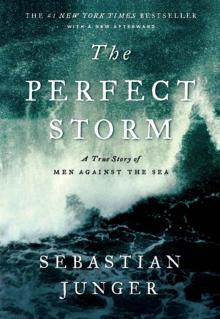 The Perfect Storm: A True Story of Men Against the Sea
The Perfect Storm: A True Story of Men Against the Sea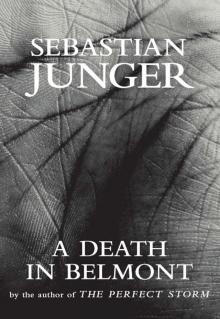 A Death in Belmont
A Death in Belmont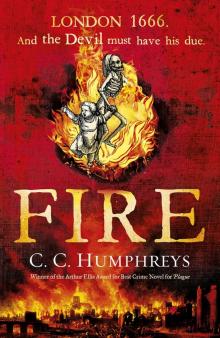 Fire
Fire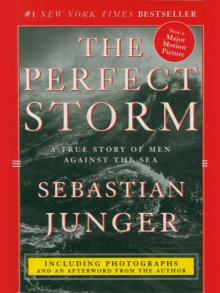 The Perfect Storm
The Perfect Storm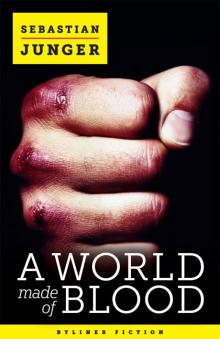 A World Made of Blood (Kindle Single)
A World Made of Blood (Kindle Single)